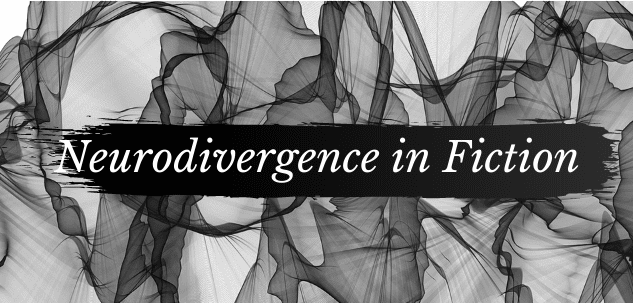
Hello all, and welcome to this week’s article for FanFiAddict’s series on Neurodivergence in Fiction. I cannot understate how appreciative I am for the overwhelming amount of support and enthusiasm I have seen for this series of mine; thank you! For the next several months we will be bringing you a guest post every Wednesday from a neurodivergent author. This will hopefully highlight some of the challenges that come with writing for a largely neurotypical audience, while also giving valuable insight to the craft itself and providing a window into the neurodivergent experience — at least through the lens of fiction. For this week’s article, Ada Hoffman has provided us with a reprint of part three of her publication, Autism, Writing, and Craft. If you need to catch up, you can view part one — on character and agency — and part two — on emotions and communication — here and here, respectively.
And, without further ado, the article!
This is part 3 of my series on what an autistic writing style looks like. Today we’re wrapping up with one more topic, and then with a bit of rumination about what, exactly, autistic authors can do about an NT market that isn’t familiar with, or sympathetic to, autistic writing styles.
6. Infodumps
If you’ve seen even one autistic stereotype, then you’ve probably seen the one where an autistic person just shows up while an NT is minding their own business and presents them with an 18,000-word monologue about trains. There’s an obvious grain of truth in this stereotype, as well as some not-so-obvious falsehoods. My mind was blown by a recent study showing that neurotypicals, on average, stay in conversations with each other about 50% longer than they actually want to. And I’m sure all of us autists know the feeling of being trapped in a conversation with an NT when we don’t want to be! But unwelcome NT conversation seems to revolve around bits of polite small talk that go back and forth. An autistic person, welcome or otherwise, wants to tell you things.
This puts us in a bit of a bind, because one of the first pieces of writing advice you’ll ever get is “Don’t infodump – let little bits of information emerge naturally throughout the narrative.” But what does naturally mean when infodumping is your natural communication style?
To put it bluntly, autistic authors infodump.
I first talked about this in my 2014 review of “Kea’s Flight,” a book about a society of non-neurotypical teenagers who often speak to each other in long infodumps. I noted that a lot of Goodreads reviewers said that the book felt “preachy” or that it “lectured” the reader. I bounced off of some of the infodumps at first, but when looking at them more closely I realized that these were the characters’ natural communication styles. They were used not only to impart information to the reader but to show how a character feels, what they’re passionate about, how they bond with other characters (yes, infodumping about a special interest to an interested person can be a bonding activity!), and how they use their special interests to self-soothe.
In the years since writing that review, I’ve noticed how infodumps are used by other authors. When an infodump is skillfully written, with a strong voice and a sense of momentum and emotion, it doesn’t even feel like an infodump to me. It just feels that the narrator is taking me aside to explain something. Gemma Files’ “Experimental Film” is from the #ownvoices point of view of an autistic film critic, and she tells the reader all sorts of things about film. Fitz Wahram, from Kim Stanley Robinson’s “2312,” is often lost in thought about something as abstract as the structure of a symphony or the nature of time. (I don’t know if Kim Stanley Robinson is neurotypical or not, but Fitz Wahram certainly isn’t!) And this isn’t limited to books about autism. One recent favorite example that springs to mind is Catherynne M. Valente’s “Space Opera” – Valente is not autistic, but has ADD. Space Opera has a chatty narrator who is constantly telling you things about the history of this or that silly planet and its music. To me it’s very fun to read this information, and it’s also an obvious nod to “The Hitchhiker’s Guide to the Galaxy,” which is similarly full of random silly fictional information. But a lot of readers in places like Goodreads bounced off of it hard, calling the narration “intrusive,” or complaining that it took away from the characters’ arcs, which are, of course – to an NT – the important part.
To me it’s become obvious that an infodump is a literary device – one that can be executed with more or less skill and to greater or lesser effect, like any other literary device. If an infodump keeps a reader intrigued enough to turn the pages, then it’s a good infodump. The problem is that some readers will find it much easier than others to stay intrigued in this way. So who are we writing for, exactly?
I ran into a problem similar to this when I published “The Outside.” I infodump about the characters’ emotions! I started to get glowing reviews from major reviewers that would say things like “This story is cool, we really like it – except for the occasional introspective longueur.” Reader after reader reported that they really liked the book except for all the introspection.
“My reviewers are telling me that my characters are too introspective,” I said to my nesting partner, Dave, who’d read the book already.
He laughed. “Have they met you?”
My characters think in the same way as me, really, because I ruminate a lot about my feelings in real life! I often don’t even understand them until I’ve meditated or journaled about them for a bit. If a character is going through something deep and psychological and complex, as Yasira does, then I simply don’t know how to make it clear to readers what’s going on except by explaining it in an introspective way. I don’t even know how NT authors do this. I suspect the official NT strategy is “don’t describe the psychological process directly, just suggest it through the character’s actions” – just as it is when it comes to dialogue.
But not being able to describe the basic things a character thinks and feels, having to show their character arc through vague innuendo and suggestion, is a mode of writing utterly foreign to me. It’s not that I can’t ever have a character communicate indirectly. It’s just that it feels like a particularly risky and difficult literary technique, akin to dramatic irony – something that I’ll do occasionally as a flourish, when the effect of saying something indirectly feels particularly good. I can’t imagine having to do it all the time.
I wrestled with this, and in the end I decided that writing introspectively is just a part of how I work. I can commit to being ruthless in improving the introspection I write – trimming unnecessary sentences and paragraphs, making sure that the voice is especially good and that it’s as interesting and compelling as possible, maybe even that it only happens when I can’t think of another easy way to get the character’s feelings across. But I can’t commit to removing introspection – not even in exchange for a shot at getting that last elusive star on Goodreads. To me, that would be perilously close to removing my characters’ inner lives altogether.
Which brings us to…
7. What’s An Autistic Author To Do?
So here are the facts so far:
- The way autistic people naturally write is different in several respects from the way NTs write, and in some ways it is actively classified as “bad writing.”
- Nobody is born knowing how to write well. Autistic authors have to learn our craft like anyone.
- But skillful writing that makes use of autistic strengths, and appeals to autistic readers, will not always be the same as skillful NT writing.
- NT editors, instructors, and critique partners won’t always know how to help us write well autistically.
- And whether we are writing for an audience of other autistic people or for the general public, to write well autistically requires us to develop skills that are harder for us than for NTs – such as the skill of identifying our own emotions.
This is one of the ways that neuro-normativity works systemically. It’s not always about NTs having a knee-jerk, active dislike of autistic people. In a lot of ways, it’s not about individuals at all. Even in a hypothetical paradise where everybody likes us, our task is in some ways still harder than an NT’s. It’s harder for us to learn our craft. Because NTs outnumber us, it’s harder to make ourselves understood.
It’s not surprising that, in an environment like this, commercial success remains elusive. Traditional publishing is not impossible for us, but it’s full of roadblocks. In the past decade, I’ve seen #ownvoices autistic authors – in speculative fiction written for adults – finding success mostly at midsize, slightly edgy, independent publishing houses: places like Angry Robot, Solaris, or Tachyon. It’s only just in the past year that I’ve seen similar authors find success with the Big Five. (One of the first such books to appear in the Big Five is Essa Hansen’s “Nophek Gloss,” published in 2020. I still need to review it; I have had great difficulty reviewing much of anything during the pandemic, unfortunately.)
A lot of autistic authors feel frustrated by this, and understandably so. Success in writing is difficult to achieve, even for the proverbial straight white neurotypical cis dude. It’s even harder when the deck is stacked against us. What are we to do?
There isn’t one answer to this question. Instead there are various strategies, each with particular benefits and drawbacks:
- Try as hard as you can to assimilate and write like an NT, perhaps while remaining in the closet.
- Try as hard as you can to write well autistically, while also pursuing commercial success through traditional publishers and gatekeepers, knowing you’ll have to fight particularly hard to be recognized and understood in this environment.
- Declare that the only audience you are interested in writing for is other autistic people, and self-publish (or perhaps publish through a micropress run by and for autistic people) so that you can bypass the gatekeepers and get straight to the audience you care about.
- Give up on commercial success and express yourself in a medium where there is no money involved, such as fanfiction.
- Combine several of the above into a hybrid approach, depending on what works best for a particular project.
My own approach, at this point in my career, is a hybrid approach. My novels are traditionally published. Side projects like “Million-Year Elegies” are self-published; these are books that I understand have niche appeal, and rather than trying to prove their worth to publisher after publisher, I’d rather just put them out there for whoever’s interested.
Some people swear by the self-publishing approach, precisely because, when you self-publish, you don’t have to satisfy any neurotypical gatekeepers. I’ve seen people on Twitter go so far as to say that self-published books are the only place you’ll find “real,” “authentic” autistic writing that doesn’t censor itself to appeal to the mainstream – which feels a bit insulting/erasing to me, but certainly I can see how self-publishing makes these things easier.
Self-publishing works very well for some of us; I’m not knocking it. But financial success when self-publishing depends on your ability to create a lot of work, on a rather gruelling schedule, and market it aggressively; it also requires you to be responsible for every part of the publishing process, including creating a cover, formatting, and finding editors, or to find and pay (or trade with) someone who can do those things for you. This doesn’t work for everyone – the “market it aggressively” part, in particular, is just impossible for many of us. And at the end of the day you’re still trying to attract readers who will mostly, unless they are all autistic themselves, be viewing your writing through a non-autistic lens.
In the end, there isn’t one magic business model that lets us do an end run around structural ableism. Every autistic author, and every autistic project, is going to have a range of issues that make it challenging to write and market. For different authors and different projects, at different times in our lives, there will be a different least-bad option.
In the meantime, it’s not only a question of the business model we choose. Just as urgently, it’s a question of how we’re going to hone our craft and keep our spirits up, knowing that some aspects of craft will forever be more complicated and harder for us to deal with, and that NTs will sometimes actively reject us or lead us astray, either through ableism or through simple unfamiliarity with what works for us. There’s no magic end-run around these problems, either, but here are some strategies I’ve found helpful:
- Make friends with other autistic authors who are facing similar issues in publishing, especially those who are writing in a genre similar to yours. Have someone to commiserate with who can reassure you that you aren’t making the issues up!
- Read the work of other autistic authors and note what you like and dislike. Just because they are autistic doesn’t mean you have to like everything about their writing – but sometimes you will find yourself enjoying or admiring something even if it isn’t “good writing” for NTs, and thus learning about yourself. It’s useful to learn how to notice when that happens.
- Find autistic critique partners and beta readers. You don’t have to have all your beta readers be autistic, but it really helps to have a go-to autistic person or two who can help you figure out what’s going on in those tricky cases, like the one I talked about in Part 1, when Yasira felt flat.
- Find some way to insulate yourself, as much as possible, from ignorant NT commentary on your work. It will happen. Resist the tempatation to read your Goodreads reviews! One thing that my agent does, which I think is very smart, is that she doesn’t pass on acquiring editors’ comments to me when they reject my books. We simply agree on a list of who she’s submitting to, and she tells me who’s said yes or no as the responses come in. It’s very painful to hear an endless litany of “I, a powerful NT, couldn’t connect to your autistic character,” or worse (and there IS much worse, as I’ve heard consistently from most of my autistic writing friends). Please spare yourself that heartache if you can. It is important to know how to take criticism, but that doesn’t mean you have to listen to the same drippings of ableism over and over again. Instead, find a small group of people you trust to give insightful critique and suggestions for improvement, and listen to critique from those people. Give yourself permission to ignore the rest.
- Signal boost and help promote other autistic authors. Not just out of solidarity – though, that too! – but because it’s in your own enlightened self-interest. The more autistic authors become successful, the more NTs will read our best books and become used to the way we write. The more NTs slowly learn to understanding an autistic writing style, the more open they will be to more of those books, by more autistic authors, and the more the barriers of structural ableism will start to come down – for all of us.
About the Author

Ada Hoffmann is the author of the space opera novel THE OUTSIDE, the collection MONSTERS IN MY MIND, and dozens of speculative short stories and poems. Ada’s work has been a finalist for the Philip K. Dick Award (2020, THE OUTSIDE), the Compton Crook Award (2020, THE OUTSIDE), and the WSFA Small Press Award (2020, “Fairest of All”).
Ada was diagnosed with Asperger syndrome at the age of 13, and is passionate about autistic self-advocacy. Her Autistic Book Party review series is devoted to in-depth discussions of autism representation in speculative fiction. Much of her own work also features autistic characters.
Ada is an adjunct professor of computer science at a major Canadian university, and she did her PhD thesis (in 2018) on teaching computers to write poetry. She is a former semi-professional soprano, tabletop gaming enthusiast, and LARPer. She lives in eastern Ontario.




Leave a Reply